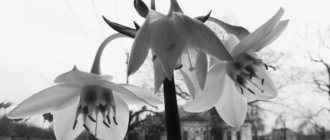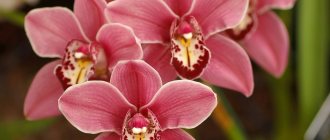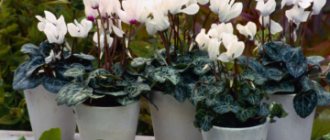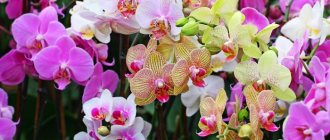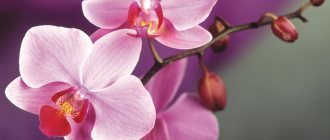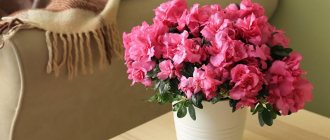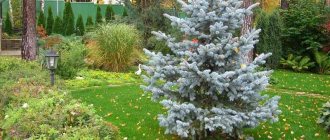Is it possible to keep indoor ivy in the house: an energetic explanation
This is a vampire plant. According to legends, it absorbs the energy of the surrounding space and people. But this is not always a bad thing, since the flower absorbs both positive and negative energy. Therefore, if strong quarrels regularly arise between the inhabitants of an apartment out of nowhere, you should think about getting ivy in the house.
Esotericists say that the plant “absorbs” negative thought forms that inevitably fill the space after each conflict. It is capable of permanently expelling dark egregors from the room, provoking household members to display anger, envy and other negative emotions.
Since ancient times, it was believed that indoor ivy fights both internal and external enemies of home owners. Serves as a talisman against evil spirits seeking to destroy harmony in the family.
However, it is worth remembering that, having absorbed all the negativity, ivy does not calm down, but switches to the good, positive energy of the room. While the green bindweed grows with lush shoots, the inhabitants of the house become more and more lazy, slow and apathetic.
Bad Omens
Although hoya is a fairly popular houseplant, some are wary of it. The reason lies in superstitions that attribute negative properties to the flower. Wax ivy is called an energy vampire. If you believe the signs, his stay in the apartment can have a bad effect on the household. Vyun is often accused of causing quarrels and scandals at home. However, those who love this plant and have been growing it for many years do not notice anything like this.
According to superstition, ivy should not be used for landscaping walls in the bedroom of a baby or an elderly person. Such people have weak energy, and a vampire flower can undermine their health.
The ivy plant is associated with a sign concerning women. According to legend, married people should not bring an overgrown vine into the house, as it will destroy family ties. As a result, the husband will begin to cheat on his wife or go to live with another.
https://youtu.be/https://www.youtube.com/watch?v=sb2WSvJW6lQ
_
What does ivy bring to the home: the main properties of the plant
Positive traits:
- absorbs the negative energy of the room;
- stabilizes the emotional background of the inhabitants of the house;
- gives its owners determination in making important decisions;
- cleanses space from the evil eye and damage.
Negative properties:
- feeds on positive energy;
- causes fatigue, apathy;
- provokes alienation between spouses;
- capable of completely destroying a relationship that is already on the verge of failure.
Does the flower bring misfortune?
Some beliefs about this plant are so scary that many people give up the idea of growing it at home. For example, one of the signs says that hoya can kill a person with its aroma. However, this information has not been scientifically confirmed. The stems, leaves and petals of the vine do not contain toxic substances.
Only those people who have been diagnosed with asthma need to be careful. If allergens enter the respiratory tract, they can cause swelling of the mucous membranes and an attack of suffocation.
Folk signs and superstitions about ivy kept at home
- Like cacti, this plant is controversial. You can never be completely sure what it will bring more to the house: harm or benefit. There are many folk signs and beliefs associated with this green bindweed.
- Since ancient times, indoor ivy has been popularly called “husband.” It was believed that any man would sooner or later leave the house where this plant grew. They especially warned against raising an unmarried girl in the room: this promised her the prospect of never meeting her betrothed and remaining an old maid. It was also dangerous to bring a flower into a house where all the men were on military service at that time.
- Ivy should only be taken as a young shoot. Never accept a mature plant as a gift, even from someone you trust. All the bad karma of his past habitat will move into your house and sooner or later will make itself felt.
- Do not plant next to other vampire plants, such as monstera or hibiscus. This proximity enhances the negative properties of ivy several times. It is also believed that when plants are close, they begin to compete and destroy each other. It's best to balance out the ivy with energy donors such as geranium, amaryllis or aloe.
- In order for a man to find out his fate, he is recommended to pick 10 ivy leaves on the first Sunday after the Christian Trinity. One of them should be thrown away. Place the remaining 9 under your pillow and expect a prophetic dream that night.
- This is an unpretentious plant. It does not require much sunlight or frequent watering. However, if a careless owner forgets even about basic care, the bindweed will definitely take revenge. And in the most unexpected way.
- If the flower suddenly withers or drops its leaves, financial losses await you.
Ancient uses of ivy
In the old days, the houseplant ivy was considered a healing and also a magical herb. They were used to treat respiratory diseases, especially whooping cough, and eye diseases. It was believed that a daily water infusion of ivy leaves could help even the blind.
Fortune-telling superstitions about ivy are widely known: a young man plucked 10 leaves from a climbing branch, chose one and threw it away, and put the rest under his pillow. If your beloved was not yet there, you dreamed about her at night. When she already had a betrothed, the answer came in a dream whether the bride would be faithful for life. Believe it or not, it's everyone's choice. The main thing is what to expect from life yourself.
Who can and who can’t grow indoor ivy in an apartment
- Ivy is a male plant. Stimulates such qualities as courage, will and determination in the people with whom it is located. Dispels internal doubts and tossing, helps get rid of tightness and complexes.
- The flower would be appropriate in the apartment of a young man who is focused on building a career or organizing his own business. This plant gives self-confidence and eliminates ill-wishers and competitors from the path.
- Ivy helps get rid of bad habits such as smoking, alcoholism, and excessive passion for computer games. This plant can also help those who want to stop overeating and lose weight.
- A young woman who is determined to get married in the near future should not keep indoor ivy in her house. After all, he will jealously guard his owner not only from enemies, but also from all potential suitors.
- An ivy phytowall is perfect for offices, educational institutions and other workspaces. And not only because it will decorate any interior and will have a beneficial effect on the air in the room. But also for the reason that the flower has the ability to extinguish scandals that often break out between colleagues on work issues.
- But how bindweed will affect family conflicts is a controversial issue. Ivy knows how to “absorb” the nervous tension prevailing in the house and defuse tense situations. It is recommended to take it to an apartment where there is a hyperactive child or a man who is unable to control his aggressive nature. However, this plant can also contribute to the final disintegration of the marriage union, if everything is going that way.
- Ivy affects people of different psychotypes and temperaments differently. It calms and relaxes violent choleric people, but in melancholic people it can cause loss of strength and even depression.
What does the flower symbolize?
Hoya is an evergreen liana-like shrub from the Kutrovaceae family. Its natural habitat is the tropical forests of East Asia. To those who look at hoya, it seems that it is artificial. The dark green leaves have a rough texture and the flowers appear to be cast from wax. Thin shoots of vines at home grow up to 5 meters in length. A beautiful plant attracts the eye and delights people.
Do not confuse hoya fleshy, which is often called wax ivy, with common ivy (hedera). These are completely different plants belonging to different families, although they have some similarities.
Hoya is an evergreen plant, so it symbolizes youth and immortality. She is associated with such qualities as coquetry and curiosity. She is often compared to a young girl who, due to her young age, continues to behave childishly. According to signs and superstitions, growing indoor ivy at home can bring invaluable benefits to its owners, but some believe that it can harm household members.
The benefits and harms of hoya for humans
Wax ivy, or hoya, to which signs and superstitions attribute magical properties, has many beneficial properties. The leaves of the plant purify the air well and release a lot of oxygen. Thanks to this, brain activity improves and performance increases. Hoya reduces the harmful effects of electromagnetic radiation emanating from household appliances. In addition, ivy secretes phytoncides that prevent the development of pathogenic microflora.
This flower is recommended to be kept at home for those who suffer from furunculosis or carbunculosis. Ivy contains substances that inhibit staphylococcus bacteria. Chiryak will ripen and open faster if you apply plant leaves to it at night.
In some cases, ivy can cause harm to humans. People with allergies should not grow it at home. During flowering, pollen enters the air, which can trigger the development of an allergic reaction. The juice from the leaves causes skin irritation in some people, so it is better to care for the flower with gloves.
Read also: Bad and good meanings of omens associated with the cuckoo
General information
Its natural habitat is the humid subtropical regions of Asia, Africa and Europe.
There the plant can reach a length of 30 meters, and sometimes in gardens too. The size of indoor ivy is, of course, more modest, but in the variety of species the flower is not inferior to its natural “brother” - there are more than a hundred forms, differing in color, leaf shape, and size.
Human attention has always been drawn to ivy : sometimes it was extolled, as in Ancient Greece, considered a symbol of love, or it was feared that, according to signs, ivy could cause harm to a person, attracting troubles and troubles.
The plant has also found application in medicine; medicinal tinctures and other preparations are prepared from it.
Indoor ivy: can you keep it at home, signs and superstitions
This houseplant is even sometimes called a “husband buster,” supposedly because it can destroy the relationships of loved ones, so some believe that it should not be kept in the house.
The problem interested psychoanalysts, who made the following conclusion: ivy is capable of absorbing (like many of our other green helpers) tobacco smoke, substances toxic to humans emitted by varnished furniture, any “chemistry”, for example, fumes from aerosols, household drugs, but in addition to all this, it can absorb bursts of aggressive energy.
This amazing ability distinguishes ivy from many other representatives of domestic flora and gives rise to various superstitions.
This quality, according to experts, can be used for “peaceful purposes” by placing the flower in a room where there are hyperactive children - home ivy will act as a sedative , or keep it in a room where not the most pleasant guests often drop in to neutralize that negativity which they will bring with them.
Most popular varieties
Ivy looks especially interesting in the interior if it comes in different varieties. Popular species include hoya (wax), Canary ivy, Colchian ivy, English ivy, and hedera.
Hedera
Canary ivy
A distinctive feature of this variety of ivy is the absence of aerial roots, so the owner must take care of reliable support for the vine and regularly provide “hairdressing services” to the pet.
Among the “Canaries” there are varieties:
- "Gloire de Marengo" (with reddish stems);
- “Golden leaf” (golden shades are added to the main color);
- "Brigitta" (this variety has the smallest star-shaped leaves, and the stems are distinguished by grace).
Colchis ivy
The leaves of Colchis ivy are even larger than those of the “Canary”, their average dimensions are 25x17 cm. The leaves are usually whole, very rarely three-lobed.
Unlike other varieties, Colchis ivy smells pleasantly of nutmeg. Here are the varieties offered for home breeding:
- "Dentata Variegata" (oval leaves, pale yellow at the edges);
- "Sulfur Heart" (leaves curl slightly inward);
- "Arborescens" (produces the effect of "drooping" shoots).
Variegated
- It is placed in the living room or kitchen (in a flowerpot).
- Unlike its undemanding counterparts, this species needs the sun, otherwise it loses its colors, fades and even ceases to live up to its name.
English ivy
This species can be formed as a columnar tree or as a hanging crop. Not only the color, but also the shape of the leaves is striking in variety - they can be elongated, lobed and even heart-shaped. The plant has aerial roots.
Flowers appear only on a sunny windowsill (the “Englishman” will not bloom in the shade), they are small, yellow, grouped into “umbrellas”, but, alas, smell unpleasant.
The resulting berries of a thick, almost black purple color will also not please you - they are poisonous, which means that English ivy cannot be grown in a house where there are small children who are used to trying everything by taste. Among the varieties used in indoor floriculture:
- "Harald" (with round leaves);
- "Sagittaefolia" (with leaves shaped like a star);
- "Ivalace" (with corrugated edges);
- "Mona Lisa" (in yellow tones).
Wax ivy hoya
This variety is distinguished by fleshy glossy leaves. Aerial roots form on stems, which in young plants are soft and can be given any desired direction. However, over time, the stems become woody, so it becomes increasingly difficult to give them any shape.
In nature, hoya finds shelter in the shade of tall trees; at home, the plant is also not very demanding on lighting - only in winter will ivy need a south window, which provides more light. Therefore, caring for wax ivy at home is not difficult.
At other times of the year, windows facing west and east will be most suitable. This does not prevent the plant from delighting its owners with flowering: the fragrant star flowers are collected in baskets and look very elegant. Learn more about caring for Hoya wax ivy here.
Indoor ivy: care at home
Proper care of indoor ivy is the key to the fact that the plant will delight you and delight your guests for many years.
Selecting a location
- Choosing a place is not only about light (especially since most species of this vine prefer shade and can be grown even deep in the room), it is also about support for the stems, an opportunity to grow and develop.
- For hanging varieties, for example, a place at home near the wall is suitable - young shoots will be provided with sufficient space.
- ATTENTION : this culture does not like moving, so you should try to immediately choose a permanent place for the green pet, where it will be comfortable.
Soil, pots
The soil required is slightly acidic. Composition – different types of soil (turf, humus, leaf), sand and peat. All components must be taken equally, and treated with a solution of potassium permanganate before use.
- You can not only prepare the composition yourself, but also purchase it in a specialized store - the “Universal” flower mixture is suitable for ivy.
- A drainage layer (made of expanded clay, crushed brick or pebbles) is poured onto the bottom of the pot; its height is from 3 to 5 cm.
- The soil covering it should be loose and allow both moisture and air to pass through.
- The root system of this indoor flower is superficial, so a very deep ivy pot is not needed.
The best option is a medium-sized container that is stable enough and made of high-quality material to last for several years. When the time for replanting comes, you will need a pot 2-3 times larger than the first, not very deep, but with a large diameter.
Watering and fertilizing
This indoor flower especially needs watering in the summer - the soil must remain moist at all times. In winter, watering is reduced to a minimum, and sometimes completely abandoned. However, you still cannot forget about the green pet, otherwise a brown edging will appear on the edges of the leaves, they will begin to dry out and fall off.
- For irrigation you will need soft water.
- You can take tap water that has been standing for several days.
- In hot weather, ivy will benefit from a shower and wiping with a damp cloth.
Fertilizing is carried out twice a month, best of all with complex fertilizers that are quickly absorbed. In the cold season, the number of feedings is reduced by half.
Planting and transplanting
If you decide to get ivy for the first time, it is best to plant it using a cutting, asking your friends for it. Each shoot node has root primordia, so planting and rooting of the future plant will take place quickly and without problems.
The need for replanting arises when roots begin to emerge from the hole in the bottom of the pot. If you do not wait for this moment, then it is advisable to adhere to the following schedule: transplant young plants into a new pot every year, older flowers - once every two years, adult specimens do not need to be disturbed, but only carefully replace the top layer of soil with fresh substrate.
Propagation of ivy at home
If you have ivy at home, consider that you have provided yourself with planting material. All that remains is to choose the best way to do this - using cuttings, layering or shoots.
From seeds
It is quite difficult to propagate ivy from seeds at home, and all because your own seeds simply do not have time to ripen.
Those purchased externally, unfortunately, very rarely have varietal characteristics, especially of the specific type that may interest you. In addition, the germination process itself is difficult (in the natural environment, seeds undergo pre-treatment in the stomachs of birds, which activates their germination).
Seeds usually sprout two weeks after they hit the ground. When the first true leaf appears, the plant needs to be pruned.
Cuttings
10 cm long apical shoots are used as cuttings. It is desirable that they have aerial roots. The cuttings are planted in pots with nutritious soil (you can have 3 pieces in one). After rooting, they are planted in separate containers. You can also germinate cuttings in water.
By shoots
When propagating ivy in this way, cut off a shoot on which 8-10 leaves are located. A cut is made along the shoot, placed on the ground and pressed into it, going two centimeters deep. After a couple of weeks, roots usually form along the entire length of the shoot. By cutting the vine into several pieces (each should contain at least 1 leaf), you get several pieces of high-quality planting material.
By layering
This method is almost the same as propagation by shoots. The difference is that the shoot is not deepened into the soil, but only pressed against it, pinned with staples.
Ivy on the balcony
- This plant perfectly decorates the balcony.
- It is most convenient to place it in a hanging basket.
- To prevent water from flowing down after watering, cover the bottom of the basket with a reliable film, pour a layer of drainage onto it, and only then add nutrient soil.
- The basket should be placed on the balcony so that the plant is not exposed to direct sunlight.
In winter, such structures are usually brought into the house so that the plant does not die, because even a glazed balcony will not protect the “subtropical guest” from sub-zero temperatures.
The ivy lashes are pre-rolled and laid on the ground so that in such a compact form the plant is waiting for warm spring days.
Possible diseases
In some diseases of indoor ivy, a person must look for his own fault. The leaves turn yellow - it means there is too much watering; dry out - the air in the room is too dry; become too small - the ivy does not get enough light.
Sometimes you have to fight aphids; one of the alarming signs is curling leaves. Spider mites can be recognized by characteristic punctures on the leaf blade and the web entangling it from below.
A white leaf on top and brown spots on the bottom warn of the presence of a pest such as yellow thrips.
Scale insects and mealybugs also pose a danger to the plant.
How can it be dangerous?
Do not forget that all varieties of ivy contain life-threatening toxic substances. When pruning plants and other manipulations, you must wear protective gloves. If the juice from a cut shoot gets on the skin, it instantly causes irritation. Hedera juice is corrosive to the skin because it contains very caustic, toxic acids .
When ivy begins to bloom, a rather unpleasant, repulsive odor emanates from its flowers, reminiscent of the smell of rotting or fermentation. Therefore, indoor ivy is not suitable for all amateur gardeners.
According to popular beliefs, Hedera is a living creature that feeds on the energy of people, animals and other plants. It is not without reason that other flowers often die next to indoor ivy, and especially sensitive people experience dizziness and loss of strength. Such plants are called energy vampires. They are not recommended to be kept in rooms where there are children or patients with cardiovascular diseases.
It is highly undesirable for single women to have ivy in their apartment , as it easily repels men.
The interpretation will be based on the state of the flower
The flower is able to warn its owners about impending danger or trouble. It is important to carefully monitor the condition of the leaves and shoots. The most common signs about house ivy:
- Despite good care, the leaves on the plant suddenly began to turn yellow - this is a warning of an impending disease. You need to pay attention to the health status of household members and try not to ignore the first alarming symptoms.
- It is a bad omen if the ivy plant dries at home. This means that an enemy has appeared in the immediate environment, a person with bad intentions. You need to think carefully about who it could be. Perhaps this is a new acquaintance or colleague who harbors anger in his heart and wants to harm one of the family members.
- If a bush growing near the house suddenly dries up, it means that the family will face financial difficulties.
- According to legend, wax ivy blooming at the wrong time is a bad sign. It's likely that trouble will happen soon.
Everyone decides for themselves whether to believe the signs about ivy or not. Many gardeners are very happy to grow a beautiful liana in an apartment. However, they do not feel any harm from the flower. Due to its wide distribution, hoya grows in many homes, including those where various misfortunes and troubles have occurred. This is probably why the plant fell into disrepute over time. However, there are many more happy families who successfully grow this luxurious vine.
Popular beliefs
Good
It is believed that if Hedera grows in a room, then goodness reigns in the house . Psychics and bioenergetics experts claim that this plant helps resolve family conflicts and calms partners.
It is recommended to buy it for hot-tempered people and hyperactive children.
There is a belief that if you keep the plant at work or in the office at home, then things will improve. All thanks to the fact that Hedera personifies vitality and strength of spirit. Therefore, shy and insecure people are advised to buy indoor ivy .
Ivy is a reliable remedy against damage, the evil eye and envy. It absorbs the negativity coming from your guests. If a person enters the house with the intention of harming you, the flower will prevent this.
Bad
It would seem that the plant fills the room with positive energy, attracts all the good things, and needs to be planted at home. However, many believe that Hedera has a terrible feature - energy vampirism. But is it?
It’s worth making a clarification here - initially the plant absorbs negative energy, and only when it eats it up is it mistaken for positive . Therefore, it is better to keep ivy on the balcony or in the garden in front of the house. As soon as you feel that the atmosphere in the house is heating up, a scandal begins, bring it into the room. Let the plant absorb all the bad things and then send it back.
- If all the walls in the house are covered with ivy, then a lonely girl will not marry, since the plant will repel representatives of the opposite sex from her.
- A branch falling off a large and strong plant foreshadows collapse and large financial losses.
- Melancholic people who plant such a flower will become even more vulnerable.
- If the ivy has begun to dry out, then you should pay attention to your surroundings; perhaps an enemy has appeared among your loved ones. The flower absorbed its negative energy, thereby protecting the inhabitants of the house.
- If the leaves begin to turn yellow, then you should pay attention to the health of your family. Yellowing leaves indicate that there is unhealthy energy in the house and it is worth taking appropriate measures to improve it.
Why does Hedera bloom?
Hedera is an unpretentious plant to which a variety of properties are attributed. Depending on what happens to him, you need to prepare for different life situations.
- If ivy blooms in the house , this is an excellent sign for a married woman. He makes her understand that her husband is not cheating and loves only his woman.
- If the plant blooms at the wrong time , it portends a family disaster that can lead to death.
Why do you dream?
Interestingly, in Egyptian, Semitic mythology and Christian religion, evergreen ivy clinging to a support symbolized immortality and devotion.
- Dreaming of curly shoots of ivy is a symbol of health and prosperity.
- If a young woman had a dream that she was entangled in a thicket of ivy and could not get out of its tenacious embrace, then in reality her secret romance will not bring her happiness.
- Ivy growing on trees and walls of houses portends good health and good luck. Such a dream brings a lot of joy and success. It promises popularity and respect for a young lady. If she sees ivy growing on the wall of a house in the moonlight, she will secretly meet with a young man.
Since ivy needs support, it symbolizes friendship, a person you can rely on, a helper, an ally.
This is an evergreen plant, so seeing dried or yellowed ivy in a dream is a sad sign that foretells bad changes.
- Planting Hedera in a dream - in reality you are striving for friendly communication, need love, help, and are looking for an opportunity to share your problems with someone.
- If you dreamed of ivy that filled everything around , then this dream prophesies that in the near future your friends or relatives will need help and participation, and you will give them all your time and energy, but this will not become a burden for you, but on the contrary, it will be joy.
- Seeing ivy crawling along the ground is an unkind sign, foreshadowing a break in relations with a loved one about whom you will be very worried.
- If in a dream ivy destroyed the plant that it intertwined , then in reality you will be let down by a person whom you trust very much.
